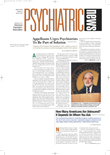Incoming APA President Marcia Goin, M.D., challenged psychiatrists at the Opening Session of APA’s 2003 annual meeting in San Francisco last month to become active in advocacy efforts on behalf of people with mental illness to ensure that they have access to the high-quality care they need and deserve.
“We must be front and center in the battle for our patients and our profession or our patients’ needs will go unheeded and our profession diminished,” declared Goin, director of residency training and the adult psychiatric outpatient department at Los Angeles County General Hospital/University of Southern California School of Medicine.
Much of Goin’s speech echoed the remarks of outgoing APA President Paul Appelbaum, M.D. (see
page 1), making it clear that she plans to continue the challenging work to which he had devoted much of his presidency and whose goal is a major overhaul of this country’s broken mental health system—if it can even be called a “system.”
“The American Psychiatric Association must continue to expand its programs to increase public awareness, press for access to care, battle for destigmatization, and assure the recruitment and training of researchers and clinicians to improve patient care and safeguard the future of psychiatry,” she said.
Paradoxically, Goin noted, these are both the best and worst of times for psychiatry: These are the best of times because of the galloping pace at which advances in the understanding and treatment of psychiatric illness are being made, but they are also the worst because psychiatry cannot deliver the benefits of science to all those who need it.
“The closing of psychiatric hospitals, the subsequent crowding in psychiatric emergency rooms, and the elimination of community mental health resources speak to the abandonment of our nation’s health and social responsibilities,” said Goin, who is also a private practitioner. “We must vigorously address the root causes and the consequences of this political folly.”
Just some of these consequences are homelessness, disintegration of families, loss of work productivity, increasing numbers of mentally ill people in jails and prisons, and inadequate resources for the juvenile court system and children from disadvantaged backgrounds.
“Untreated psychiatric patients don’t disappear,” Goin pointed out. “They sit in overburdened emergency rooms, often live on the streets, and ultimately may wind up in jail. Long-range planning imperatives must meet the needs of the psychiatric patient community in these hard economic times.”
She noted that, in addition to state and federal legislators, APA continues to educate decision makers in business and industry about the enormous costs of untreated or poorly treated mental illness. In the United States, $24 billion a year is lost in disability, absenteeism, and decreased productivity. She cited a recent study indicating that 70 percent of 723 employers found that stress or depression had markedly increased as a disability condition—much higher than that of other health problems, such as cancer and heart disease.
While the attainment of true parity for mental health coverage on the federal level is closer than ever, the latest parity legislation before Congress would apply only to employers with 50 or more workers and to health plans in which psychiatric benefits are already offered. “Under such fiscal constraint,” Goin observed, “employers may well drop their mental health coverage or circumvent the legislation by requiring higher copayments and deductibles.”
To help solve the crisis in mental health care in this country, Goin said that APA must assemble a group of experts “to explore the impact of current policies upon psychiatric care and to construct politically viable recommendations to improve health outcomes for the mentally ill, the disadvantaged, and children and their families.”
Turning her attention to other challenges within the profession of psychiatry, Goin referred to the divide that began in the 1960s between the “biological” psychiatrists and the “psychologically committed” psychiatrists. Such polarization, she noted, is unfounded today and contrary to patients’ best interests.
“We have gone far beyond the search for the single gene or neurotransmitter to explain psychiatric illness, to an understanding that the biological processes are far more complex and involve both facilitating and protective elements that in turn are highly influenced by environmental and developmental factors. It is folly to separate nature from nurture and see them as independent of one another. In both research and in clinical practice we must strive for an integration of these complex factors that will lead to greater depth in understanding our patients, and therefore to better treatment.”
In addition to encouraging and facilitating the integration of the biological and psychological in education, research, and clinical practice, under Goin’s leadership APA will continue to influence clinical practice through the development and revision of practice guidelines and continuing medical education.
“Our capacity to do better has never been greater,” she told her audience. “This nation has always been a work in progress and it will always be. This national view is mirrored in the values of our APA. We have it in our power to take our organization to new heights of accomplishment. That is our challenge. Your APA is there to meet that challenge, and I am proud to be a part of it. We need your help and involvement in the years ahead, and from the look of the crowds gathered here in San Francisco, I see that we can count on it.” ▪

